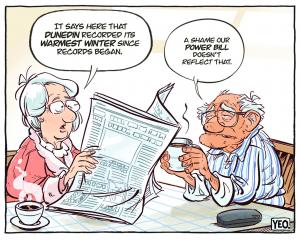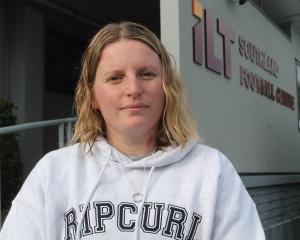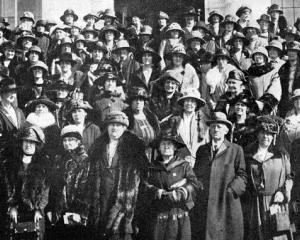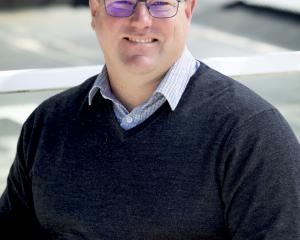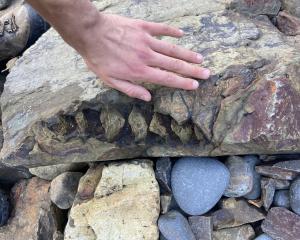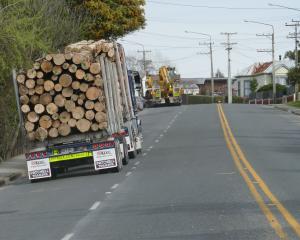Some of this might seem familiar, warns Rowan Wernham, co-director of a film premiering in the Doc Edge Festival tonight.
The Dunedin-raised film-maker’s documentary is called Pistachio Wars, and in a case of fact blurring with fiction blurring with fact, the earlier film it might recall is Chinatown, the Jack Nicholson-starring tale of greed and double-dealing in California.
Both tackle the US state’s fraught history of access to water resources. And both interrogate the limits to business ambition, and greed.
The Roman Polanski-directed Chinatown was based around the battle for water rights between the city of Los Angeles and farmers in the Owens Valley in the early decades of last century.
"Chinatown has this character, Noah Cross, who has taken over the water and is building a suburban development. It’s based on a water heist, the theft of Owens Valley, so there’s the greed," Wernham says by way of precis for the Hollywood classic.
"But then there’s this extra level of depravity."
At the heart of his own film, his first, made in collaboration with American journalist Yasha Levine, is another breathtaking grab for water resources in California — in order to build a business empire.
Central to his story, the humble pistachio. The small green nut — a member of the cashew family — has in recent years been marketed to billion-dollar success by power couple Stewart and Lynda Resnick.
And just as in Chinatown, Pistachio Wars delivers an extra kick.
The documentary reveals a curious connection between the snack food and the daggers drawn stand-off between the US and Iran.
"It turns it from ordinary greed into something kind of next level," Wernham says.
That’s not all though.
Pistachio Wars also zeroes in once more on the turn agriculture has taken towards operating as an extractive industry, at the expense of the environment, and wrestles with the nature of consumer culture and the dangers of monopoly power.
"Yeah, I mean, that was probably part of our challenge, there’s just so much material," Wernham says over the phone from New York. He splits his time these days between the US and Otago Peninsula.
"And then you’re dealing with the complexity of the material. Like, how much do you explain about the water system? How much do you explain about pollution?"
What they didn’t have to worry about was whether the film’s leading couple would be sufficiently cinematic. The Resnicks, owners of "$US6 billion agricultural powerhouse" The Wonderful Company, are larger than life, by their own design.
Indeed, just this past week they were the subject of a piece in the Los Angeles Times headlined "Lynda and Stewart Resnick: Agricultural barons". The story noted their 75,000 hectares of Central Valley, California farmland, before going on to discuss their 2019 $US750 million ($NZ1.2 billion) donation to Caltech, The California Institute of Technology, to fund sustainability research. It was then the second-largest US higher education gift of any sort, the paper reported.
The money is from pomegranates — the Resnicks juice them — mandarins and pistachios. The high society pairing are now by far the biggest producers of pistachios in the US, a claim to fame they couple with being among the globe’s biggest private owners of fresh water. You need oceans of the latter to grow the former.
Which brings us to the Iran connection.
As the documentary explains, the US didn’t produce many of the nuts back before the Iranian revolution in the late 1970s. Back then, Iran was the unrivalled global pistachio superpower. But after the US-backed Shah fell and the US slapped sanctions on Iran, farmers in the US stepped into the gap.
"The American industry had an opportunistic approach to growing pistachios after the sanctions were put in place and Iran was blocked out," Wernham explains.
That opportunism persists to the present day, US growers remaining keen supporters of continued sanctions and the Resnicks substantial backers of a think tank that specialises in bellicose talk about Iran.
Wernham takes his camera inside a pistachio conference in the California desert resort of Palm Springs, and sure enough, Iran is high on the agenda.
It was this connection, between pistachios and geo-politics, that first piqued Wernham’s interest — some years ago now.
He jokes that perhaps precisely how long he’s spent on the film might be left off the record. Suffice to say, we’re talking years, during which time both he and Levine worked day jobs, and at one point launched a Kickstarter campaign to cover editing costs.
Even still, they went right down to the wire to get Pistachio Wars ready for the Doc Edge Festival.
But the time it has taken hasn’t diluted their documentary’s relevance. Indeed Wernham says the horrors playing out in Gaza are bringing renewed attention in the US, as elsewhere, to its policies in the Middle East and what that has meant for people there.
The entrepreneurial Resnicks probably weren’t making a geo-political play back when they first bought land in California’s Central Valley, a vast inland plain north of Los Angeles.
"The general belief is that they didn’t get into farming all that strategically. They bought up farm land and started to market the crops that were there."
Souring of relations with Iran just came along at the right time.
Soon enough, the Resnicks were on the board of the Washington Institute for Near East Policy (WINEP), a hawkish foreign policy think tank.
"Which suggests they took an interest in America’s foreign policy with regards to Iran, perhaps as they were also thinking about how they could become a dominant player in the pistachio market," Wernham says.
The empire has duly delivered — with the exception of Obama’s short-lived Iran nuclear deal that briefly threatened to open the door to Iranian pistachio exports again — allowing the US industry to remain ascendant.
"I mean, that’s why you have an empire, isn’t it," Wernham says. "To advance the interests of your major industries, who are also the people controlling the empire.
"I don’t think that they necessarily want to start World War 3, you know, they’re not evil explicitly. But, like, they’ll take the risk, maybe, of aggravating Iran and of that devolving."
The reality on the ground in California is hardly less sobering.
The film-makers’ shots of the Central Valley reveal an uncomfortable mix of industries, endless miles of intensively cropped land served by long concrete water canals, cheek by jowl with the nodding donkey pumps of the fossil fuel industry.
Pistachio Wars spends some time on both the environmental impacts of the intensive agriculture and the contamination of water resources by the neighbouring oil wells.
Pistachios require staggering volumes of water to grow in the heat of the California sun. In some seasons The Wonderful Company will consume more water than the residents of Los Angeles and San Francisco combined.
"California used to be a wetland, a bit like the savannahs of Africa — without sounding too over the top," Wernham says.
"It was a big floodplain — it was just full of birds and elks and mountain lions and bears, and very wild."
But then came California’s gold rush and successive developments on the back of it.
"It didn’t take very long for them to dam things up and, basically, completely eradicate everything that was there.
"Now we’ve got this industrialised landscape that’s just very, very bleak."
And not just for the local fauna, as there remains the requirement for someone to live near and work on the orchards.
"They’ve got mostly migrant labour, so it does operate a lot like a plantation," Wernham says.
The profits made in the Central Valley are then, for the most part, sucked back to the Hollywood Hills and the various other centres of American wealth and power.
Here, though, it’s arguable that perception and reality, marketing and facts on the ground create an ambiguous picture.
On the one hand, as the Los Angeles Times piece records, the Resnicks are "involved in a bitter union battle", challenging a California state law that was designed to make it easier to unionise farm workers.
On the other hand, they have invested in their workers’ communities, for example, by providing educational opportunities for their children. In particular, in a settlement called Lost Hills.
"It’s a really interesting site of struggle, a town like Lost Hills, because you’ve got a lot of people that have come from Mexico and income levels there might be pretty low," Wernham says.
"So there are a lot of people who are actually quite happy to make California minimum wage, or slightly above, driving pistachio harvesters."
Even if that means getting up at 4am or 5am in the morning and working for 12 or 16 hour days in the hot sun.
It’s complicated, he says.
At the same time, it’s not wise to drink the water in Lost Hills, polluted as it appears to be by an uncertain mix of industrial chemicals. Skin disease is rife.
"They have a very cheap chemical filtration system, which was causing all sorts of problems with their plumbing and making the water taste disgusting."
The Resnicks have not been shy about burnishing their images with the money spent in Lost Hills. They’re also high-profile philanthropic supporters of various civic causes back in Los Angeles — the usual suspects, universities, museums and galleries.
Among the beneficiaries is that Caltech research centre, the Resnick Sustainability Institute, the self-proclaimed goal of which is to back research that "addresses challenges and opportunities associated with climate change and the stewardship of natural resources".
"So that’s another one of these insane things," Wernham says. "It’s like, are you really sure that the people whose business depends on draining all the water out of California to sell a snack food, are the right people to fund a climate centre?"
Any climate centre they support isn’t going to come up with degrowth solutions, Wernham says. Techno-fixes seem more likely, new ways to use chemicals or technology to continue industrial production at the same rates.
The LA Times piece appears to support his suspicions.
It highlights research at the Caltech institute that has spun off companies, one dedicated to removing carbon dioxide from the ocean so it has the capacity to absorb more carbon pollution, another that aims to capture carbon dioxide from ship emissions and sequester them in the ocean.
For Wernham, the whole enterprise is a case study in market failure.
"The market, you know, the supposedly endlessly rational market, has decided that the most efficient thing to grow in California is pistachios. Because they’re the most profitable, everybody’s growing pistachios."
Putting aside for the moment that it is achieved by locking the principal competitor out of the market, it is still only possible at enormous cost to the environment.
And it is only really happening because of the Resnicks’ marketing nous. It was a big advertising launch, Lynda Resnick’s forte, in 2008 that finally established them and their business, The Wonderful Company, as the pre-eminent pistachio moguls.
"People didn’t really even know they needed them before they started getting blasted with ads."
The same land could be used less intensively to grow crops that are genuinely targeted at meeting nutritional needs, Wernham says.
"Tomatoes or something like that ... potatoes or squash ... things that are more essential to human life and can be grown in a way that’s less demanding, you know, in terms of the water impact."
But no, it’s pistachios, because that’s where the market logic pointed.
"This is what we have, the market economy that runs everything, and dictates who has power and wealth and what we do, basically, as a society. But it malfunctions."
The argument goes that consumers have their hand on the lever, theirs is the ultimate decision-making power and they’ll haul companies back into line when necessary.
"But more and more, we don’t really have any good decisions, you know. All the decisions are bad. Even The Wonderful Company is bad."
The film
• Pistachio Wars screens as part of the Doc Edge Festival.
• Premiere: Hoyts Christchurch, tonight.
• Available online as part of Doc Edge July 15-August 2.
• Dunedin premiere: Metro Cinema, Sunday, July 14, 3.20pm. Rowan Wernham will attend.
• Other films in the festival are available online July 15–31.
• Go to https://docedge.nz/
